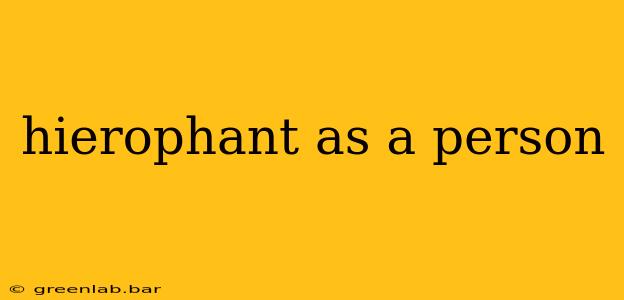The Hierophant, a major arcana card in the Tarot, often evokes images of religious authority and tradition. But understanding the Hierophant as a person goes far beyond a simple association with priests or popes. It delves into the core characteristics that define individuals who embody this powerful archetype. This exploration will move beyond the stereotypical imagery and unpack the nuances of the Hierophant personality, offering a richer understanding of this complex figure.
Key Traits of the Hierophant Personality
The Hierophant personality is characterized by a blend of wisdom, tradition, and authority. However, it's crucial to remember that this authority isn't necessarily imposed; it's often earned through knowledge, experience, and a genuine desire to guide and mentor others.
1. The Teacher and Mentor:
- Deep Knowledge and Expertise: Hierophant personalities are often deeply knowledgeable in their chosen field, whether it's a specific profession, a spiritual practice, or a personal passion. They've dedicated time and effort to mastering their craft.
- Passionate about Sharing Knowledge: They're not hoarders of information; they're eager to share their expertise with others, acting as teachers, mentors, and guides. This teaching isn't about control; it’s about empowerment.
- Structured Approach to Learning: They prefer structured learning environments and methodologies. They value tradition and established systems, using them as a framework for their teaching.
2. The Guardian of Tradition and Values:
- Respect for Established Systems: Hierophants appreciate the wisdom embedded in established systems and traditions, recognizing their value in providing structure and stability. This doesn't mean they're resistant to change; it means they approach change with careful consideration.
- Strong Moral Compass: They possess a strong moral compass and adhere to a personal code of ethics. Their actions reflect their values, and they often inspire others to live with integrity.
- Emphasis on Ritual and Routine: They find comfort and meaning in rituals and routines, seeing them as ways to connect to something larger than themselves and provide a sense of order in their lives.
3. The Authority Figure (with a nuanced approach):
- Natural Leadership Qualities: Hierophants often possess natural leadership qualities, not through force or dominance, but through inspiration and guidance. They lead by example.
- Empathy and Understanding: While authority is a key aspect, true Hierophant personalities understand the importance of empathy and understanding. They are able to connect with others on a human level.
- Focus on Collaboration and Community: They believe in the power of community and collaboration, recognizing that collective effort leads to greater achievements. They nurture relationships and foster a sense of belonging.
The Shadow Side of the Hierophant
While the Hierophant embodies many positive qualities, it's important to acknowledge the potential shadow aspects. These can manifest as:
- Rigidity and Dogmatism: An overemphasis on tradition can lead to rigidity and a resistance to new ideas.
- Control and Manipulation: The desire for order can sometimes morph into a need to control others, stifling their individuality.
- Hypocrisy: A disconnect between espoused values and actions can lead to hypocrisy and a loss of trust.
Recognizing the Hierophant in Yourself and Others
Understanding the Hierophant archetype allows for self-reflection and a deeper understanding of those around us. By recognizing these traits, both positive and negative, we can better navigate relationships, improve self-awareness, and strive for personal growth. The Hierophant isn't just a card in a deck; it's a powerful archetype that reveals valuable insights into human behavior and potential. Are you, or someone you know, a walking embodiment of this complex and fascinating personality type?

